
CALM SHEN (category): In Traditional Chinese Medicine, Shen refers to the spirit or the mind and has a multiplicity of connotations, to include: consciousness, vitality, awareness, mental function, and presence. The Shen (considered to be a physical substance—the most rarified form of Qi) resides in the Heart and blood vessels and is nourished directly by the Blood. Healthy Shen can be seen in the eyes, which will be bright and full of vitality. When the Blood is deficient, however, the Shen is said to be “disturbed” and a person’s eyes will appear dull and listless, lacking that spark of excitement in life. Clinically, this often presents as insomnia, anxiety, palpitations, panic, and depression (n.b. these terms are meant to be descriptive and not taken as equivalent to medical diagnoses, although there may be some overlap).
Herbs that address Shen disturbance are of two types:
- nourishing herbs that calm the Shen—(Suan Zao Ren, Bai Zi Ren, Yuan Zhi, Ye Jiao Teng). These are plant derivatives that have tonifying and nourishing properties to be used for Shen disturbance patterns arising from Blood and Yin deficiency; and
- sedative herbs that calm the Shen (Long Gu, Mu Li, Zhen Zhu Mu) which are mineral-based substances that anchor the Spirit in cases where the Shen disturbance arises from a pattern of excess.
It should be noted that Calm Shen herbs are for symptomatic treatment and generally meant to be used as needed. In practice, this means that while a particular formula (e.g. Suan Zao Ren Tang) can be helpful for the occasional sleepless night, determining the deeper patterns of imbalance (i.e. the root causes of the insomnia) and addressing those with the proper constitutional formula is often necessary to restoring balance over the long term.
Nourishing Herbs that calm Shen
Suan Zao Ren:
English Name: sour jujube seed, zizyphus
Pharmaceutical Name: Semen Ziziphi Spinosae
Properties: Suan Zao Ren enters the Heart and Liver channels. It is sweet and sour in nature and neutral in temperature.
What is Suan Zao Ren?: Suan Zao Ren (literally “sour date seed”) is the seed of the sour jujube date. It is commonly used in Chinese herbal formulas to address insomnia coupled with anxiety and nervousness, heart palpitations (i.e. feeling the heart flutter in one’s chest), and/or irritability, doing so by nourishing the Heart and Liver. This gives these two organ systems more resources to deal with stress and consequently helps them to relax, feel less anxious, and improve the quality of sleep.
TCM Actions of Suan Zao Ren: Suan Zao Ren benefits the organ systems of the Liver and the Heart and also calms the spirit (shen); as such it is a primary herb in the Chinese medica for complaints of insomnia, palpitations and anxiety. It also has the secondary characteristic of being astringent and as such is helpful in cases of excessive sweating (e.g. night sweats or spontaneous sweating).
Bai Zi Ren:
English Name: Biota Seed, Chinese Arborvitae Seed
Pharmaceutical Name: Semen Platycladi
Properties: Bai Zi Ren enters the Heart, Kidney, and Large Intestine channels; it is sweet in flavor and neutral in temperature
What is Bai Zi Ren Bai Zi Ren (aka Biota Seed) is the seed of the Chinese Arborvitae, an evergreen, coniferous tree native to Northwest China that is widely cultivated as an ornamental and has long been associated with long life and vitality. Its seeds are used medicinally in Chinese Medicine to address insomnia that is caused by Blood deficiency (e.g. in post-partum/insomnia associated with menses or the elderly). Another benefit of Bai Zi Ren is that it moistens the intestines to unblock the bowels, so it is an excellent choice in cases where there is also constipation due to deficiency.
It is the main herb in Bai Zi Yang Xin Wan; it is also found in many formulas that address insomnia/shen-disturbance; it is an excellent herb to add into a custom formula as well in cases of Heart Blood deficiency w/constipation.
TCM actions of Bai Zi Ren: The Primary actions of Bai Zi Ren are to nourish the Heart, calm the Shen, and to moisten/unblock the bowels.
Yuan Zhi:
English Name: Polygala, (Thin-Leaf or Siberian) milkwort root
Pharmaceutical Name: Radix Polygalae
Properties: Yuan Zhi enters the Lung and Heart channels; it is acrid and bitter in flavor and slightly warm in temperature
What is Yuan Zhi?: This herb is the root of the thin-leaf milkwort plant (Polygala) that has a long history of use in Chinese medicine as a brain tonic. Its traditional use is to clear brain fog to aid concentration (see the formula Bu Nao Wan below); it is also used clinically to settle an anxious spirit (e.g. restlessness, anxiety, palpitations, and insomnia).
TCM actions of Yuan Zhi: Calms Shen/Pacifies the Heart by dispelling phlegm and clearing the orifices—dispels phlegm in the Heart that manifests as mental or emotional disorientation (i.e. does not address blood/yin deficiency or liver constraint as do Suan Zao Ren and Bai Zi Ren). Yuan Zhi also expels phlegm from the Lung and can be used internally or topically to treat abscesses, boils, sores, or swollen and painful breasts caused by phlegm obstructing the channels.
Ye Jiao Teng:
English Name: Polygonum vine, Fleeceflower vine
Pharmaceutical Name: Caulis Polygoni Multiflori
Properties: Ye Jiao Teng enters the Heart and Liver channels and is sweet and slightly bitter in taste; its temperature is neutral
What is Ye Jiao Teng?: Ye Jiao Teng is the stalks and stems (i.e. the caulis) of the Polygonum Multiflorum, which is the same plant from which the Chinese Herb He Shou Wu is also derived (He Shou Wu is the prepared root of this plant). It used to grow wild along the river banks and valleys of the Yangtze River but is nowadays primarily cultivated for use in medicines.
Ye Jiao Teng is a commonly used in formula to treat insomnia and is best utilized when the person in question is feeling weak and fatigued. Additionally, it is especially helpful in cases of dream-disturbed, restless sleep.
TCM Actions of Ye Jiao Teng: Nourishes (Heart) Blood and Calms the Shen—this herb is best at treating insomnia due to general Blood deficiency w/excessive dreaming. It also opens the channels and collaterals and dispels wind; as such it can treat soreness/pain in joints and limbs arising from blood deficiency.
Sedative Herbs that Calm Shen
Long Gu
English Name: Dragon Bone
Pharmaceutical Name: Os Draconis
Properties: Long Gu enters the Heart and Liver channels and is sweet and astringent in flavor; it is cool in temperature.
What is Long Gu: Long Gu (literally “dragon bone”) is in actuality fossilized mammal bones (usually vertebrae and extremities) and is used medicinally in either raw or calcined (prepared) form. This herb has a variety of uses—in the context of this discussion, it shows up in the Dragon Bone and Oyster Shell Decoction formula in its raw form and is used to treat various forms of Shen disturbance (e.g. insomnia, restlessness, palpitations and mania) that also present with concurrent symptoms such as vertigo, tinnitus, dizziness, short-temper and facial paralysis (i.e. the symptomology of Liver constraint with Liver Yang rising).
TCM Actions of Long Gu: Unprocessed Long Gu calms the Liver, anchors rising Yang (w/Liver Wind), and calms restless Shen. In its processed form it is used to prevent leakage of fluids (as used in Jin Suo Gu Jing Tang—which is discussed in another section of this guide).
Mu Li:
English Name: Oyster Shell
Pharmaceutical Name: Concha Ostreae
Properties: Mu Li enters Liver and Kidney channels and is salty and astringent in flavor; it is cool in temperature
What is Mu LI?: Mu Li (although strictly speaking not a “Calm Shen” herb in the formal Chinese Medica) is a mineral substance that is found in Dragon Bone and Oyster Shell Decoction; in this formula it is paired with Long Gu and its primary function is to address the symptoms of dizziness, vertigo, and short-temper that can accompany the insomnia, palpitations, and anxiety associated with Shen disturbance.
TCM Actions of Mu LI: Mu Li addresses Liver Yang rising due to Liver Yin deficiency, the symptoms of which include dizziness, vertigo, palpitations, insomnia, irritability, and short temper.
Mu LI pairs specifically with Ye Jiao Teng for insomnia.
Mu LI also softens hardness and dissipates nodules (treating scrofula, goiter and other palpable masses from phlegm-heat), astringes leakage of fluids, and relieves stomach pain, heartburn, and acid regurgitation from Stomach Fire (in its calcined form).
Zhen Zhu Ru:
English Name: Mother of Pearl
Pharmaceutical Name: Concha Margaritaferae
Properties: Zhen Zhu Ru enters the Liver and Heart channels and is salty in flavor; it is cold in temperature
What is Zhen Zhu Ru? Zhen Zhu Ru is another mineral substance (mother of pearl) which appears in the context of the treating disturbed Shen because it is the primary herb in the formula An Shen Bu Xin Wan, discussed below. It is, much like the herb Mu LI (discussed above), used to address dizziness, vertigo, headaches, tinnitus, insomnia, palpitations and mania.
TCM actions of Zhen Zhu Ru: Germane to its use in calming the Shen, Zhen Zhu Ru anchors Liver Yang rising that is rooted in Liver Yin deficiency. It also pacifies Heart Fire arising in conjunction with Liver Yang rising.
Zhen Zhu Ru also goes to the eyes and is useful in addressing symptoms such as blurred vision and night blindness, photophobia, redness, swelling and burning (in formula with other herbs).
Common Formulas that are often used to address Shen disturbance:
-
Sale!
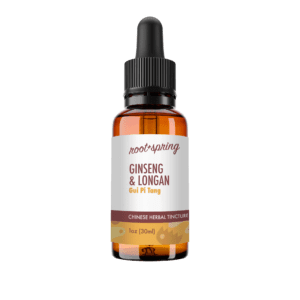 Gui Pi Tang (Ginseng and Longan) – Liquid Extract (Tincture)
Starting at $14.00
Add to CartSelect options
This product has multiple variants. The options may be chosen on the product page
Gui Pi Tang (Ginseng and Longan) – Liquid Extract (Tincture)
Starting at $14.00
Add to CartSelect options
This product has multiple variants. The options may be chosen on the product page
Gui Pi Tang: Gui Pi Tang addresses Spleen Qi deficiency (signs include difficult digestion, reduced appetite, and loose stools) with concomitant Heart Blood and Yin deficiency symptoms of insomnia, palpitations, and anxiety. The idea here is that since the Spleen ultimately is responsible for generating Blood, one must address the ultimate source of the (Heart) blood deficiency in order to truly treat a root cause of the insomnia and anxiety.
An interesting twist here is that over-thinking and excessive rumination (i.e. anxiety) can damage the Spleen (i.e. make it less effective at extracting nutrients from food and sending those nutrients (in the form of Food Qi) to the Heart to make “quality” blood). Thus the very anxiety that is a symptom a Heart deficiency syndrome can create a feedback loop—anxiety and worry damage the Spleen’s ability to produce quality blood, which leads to a deficiency in the Heart, which leads to more anxiety and insomnia, which further damages the Spleen… and so on!
-
Sale!
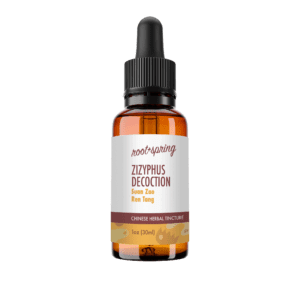 Suan Zao Ren Tang (Zizyphus Decoction) – Liquid Extract (Tincture)
Starting at $14.00
Add to CartSelect options
This product has multiple variants. The options may be chosen on the product page
Suan Zao Ren Tang (Zizyphus Decoction) – Liquid Extract (Tincture)
Starting at $14.00
Add to CartSelect options
This product has multiple variants. The options may be chosen on the product page
Suan Zao Ren Tang: Suan Zao Ren Tang best addresses insomnia rooted in Liver Yin/Blood deficiency. The insomnia is usually accompanied by fatigue (e.g. from “overwork”—you work long hours, come home exhausted, and yet you lie awake at night unable to get to sleep). The presence of irritability is another key symptom when considering the use of this formula; a third is excessive sweating (especially night sweats), hot-flashes, or other subjective sensations of heat. Awakening around 3am on a regular basis is another sign that insomnia is based in some kind of Liver constraint and can be effectively addressed with this formula.
-
Sale!
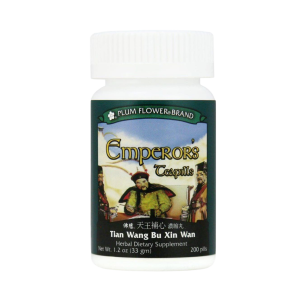 Plum Flower – Emperor’s Tea Pills (Tian Wang Bu Xin Wan)
Starting at $21.23
Add to CartSelect options
This product has multiple variants. The options may be chosen on the product page
Plum Flower – Emperor’s Tea Pills (Tian Wang Bu Xin Wan)
Starting at $21.23
Add to CartSelect options
This product has multiple variants. The options may be chosen on the product page
Tian Wang Bu Xin Dan Tang (Emperor’s Teapills): Emperor’s Teapills best addresses insomnia characterized by restless sleep and a separation of the Heart – Kidney axis (discussed briefly below). So instead of lying awake at night frustrated and unable to sleep (with nothing on your mind… almost bored), your mind might race a bit more. Indications for use of this formula are, generally speaking, Kidney Yin Deficiency signs (the most common of which are night sweats and lower backache). Other specific indications for using this formula to address the complaint of insomnia are: anxiety with palpitations, forgetfulness/inability to think or concentrate, thirst, dry mouth, and/or constipation/dry stools.
In TCM theory, the energetic Heart and the Kidney are closely linked; when the Kidney is deficient, Heart fire can be the result and this can lead to Shen disturbance. One way this “Heart-Kidney separation” manifests is when someone is frightened or shocked. This weakens the energetic Kidney—the organ system associated with fear in the Chinese system– and the energetic Heart is thereby affected. This in turn contributes to Shen disturbance (which can manifest symptomatically as insomnia, palpitations, restless sleep w/vivid dreaming/nightmares, manic episodes, and hallucinations) which needs to be addressed by strengthening the energetic Kidney (so it can “reconnect” with the Heart).
An Mien Pian: An Mien Pian addresses various manifestations of Shen disturbance (to include insomnia (esp. w/vivid, disturbing dreams), palpitations, panic attacks, and/or “feelings of fragility”) where there is a component of mild digestive difficulty (i.e. poor sleep after a heavy meal, reflux from overeating etc…). In this formula, Suan Zao Ren addresses Heart and Liver Blood deficiencies, while the herb Yuan Zhi opens the orifices of the Heart to address palpitations, insomnia, and the more manic aspects of the situation. It also addresses the vivid and disturbing dreams.
Bai Zi Yang Xin Tang (Heavenly Heart): This formula is fairly directly focused on nourishing Heart Blood and tonifying Yin and therefore is an excellent choice to address insomnia and palpitations that are rooted in Heart Blood and Yin deficiency. This formula is helpful for poor concentration and mental fogginess/fatigue as well. The main herbs comprising this formula are Bai Zi Ren—which primarily calms Shen– and a group of three herbs which act to tonify Yin and clear heat: Gou Qi Zi (goji berries), Shu Di Huang (prepared rehmannia root) and Xuan Shen.
Gan Mai Da Zao (Serene Spirit): The Plum Flower version of Gan Mai Da Zao Wan (Serene Spirit) contains the Calm Shen herbs Ye Jiao Teng and He Huan Pi to address cases of Shen disturbance (insomnia included) which present with excessive and/or uncontrollable emotional outbursts characterized by the loss of self-control (think here weepiness/melancholy, sudden panic-attacks, crying spells, inappropriate laughter/manic episodes etc…). Note that the emotional outbursts addressed range from those that appear “depressive” to those that appear “manic”; clinically (in TCM terms) the key to this formula being effective is the presence of deficiency heat with injury to the Heart Yin and Spleen Qi.
-
Sale!
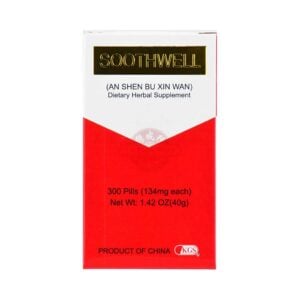 An Shen Bu Xin Wan (Soothwell)
Starting at $8.99
Add to CartSelect options
This product has multiple variants. The options may be chosen on the product page
An Shen Bu Xin Wan (Soothwell)
Starting at $8.99
Add to CartSelect options
This product has multiple variants. The options may be chosen on the product page
An Shen Bu Xin Wan: This formula nurtures the Heart function (i.e. calms the Shen) in cases where the Heart – Kidney axis is compromised (see discussion above with regard to Tian Wang Bu Xin Wan) with concomitant Liver Yang rising. In practical terms, this will often present as insomnia with vivid/restless dreaming (or nightmares). Other symptoms one might also see are palpitations, dizziness, tinnitus, and red, dry, and/or itchy eyes. The Shen disturbance itself can also manifest as severe anxiety, palpitations, and PTSD-like panic episodes.
The primary Shen-calming substance in this formula is Mother of Pearl (Zhen Zhu Mu), with a secondary calm-Shen element of this formula being the presence of Ye Jiao Tong which is a nourishing, plant-based substance for tonifying deficient Heart blood.
Bupleurum and Oyster Bone (Chai Hu Long Gu Mu Li Wan): This is a traditional Chinese Formula which in modern clinical practice is used to Calm/Sedate the Shen in cases which also present with symptoms of Liver Qi stagnation, Liver-Fire rising/Ascending Yang, and/or Heart Fire. Some examples of the symptoms one might address with this formula are intense anxiety, insomnia, manic behavior, palpitations, headaches, red/watery/burning of the eyes that occur in conjunction with acid stomach, bloating, hiccups, reflux etc… The calm Shen herbs found in this formula are Long Gu and Mu LI—both of which are mineral-based substances that help to anchor the Spirit in cases where the Shen disturbance is rooted in excess (i.e. Heart and/or Liver Fire and stagnation of the Liver Qi).
An Shui Teapills: For use with deficiency patterns of Shen disturbance that include signs of Qi deficiency (e.g. fatigue, loose stools, shortness of breath, a puffy tongue with scallop marks on the edge etc…) as well and the more common symptoms of Shen disturbance discussed earlier in this section. The Plum Flower brand of this formula is safe for long term use.
Bu Nao Wan: This formula (the Plum Flower version of which contains Suan Zao Ren, Bai Zi Ren, and Yuan Zhi) is alternately known as the “Tonify Brain Pill” or as “Cerebral Tonic Pills”; as the name suggests, it is for use in cases of poor concentration, forgetfulness, and short-term memory loss (one source mention that it is a favorite of acupuncture school students mentally exhausted from preparing for exams!). It can also be helpful in certain cases where there is confusion and disorientation (due to Heart Blood and Kidney Essence deficiency with phlegm misting the heart).


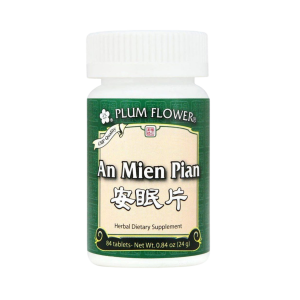 Plum Flower – An Mien Pian (Tablets)
Plum Flower – An Mien Pian (Tablets)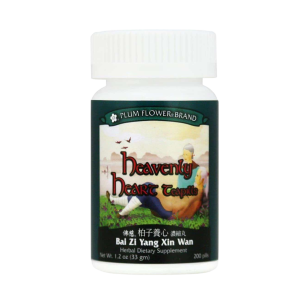 Plum Flower – Heavenly Heart (Bai Zi Yang Xin Wan)
Plum Flower – Heavenly Heart (Bai Zi Yang Xin Wan)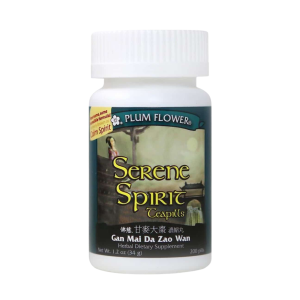 Plum Flower – Serene Spirit Teapills (Gan Mai Da Zao Wan)
Plum Flower – Serene Spirit Teapills (Gan Mai Da Zao Wan)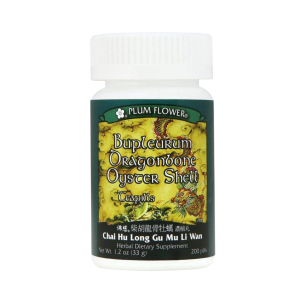 Plum Flower – Bupleurum Dragonbone Oyster Shell (Chai Hu Long Gu Mu Li Wan)
Plum Flower – Bupleurum Dragonbone Oyster Shell (Chai Hu Long Gu Mu Li Wan)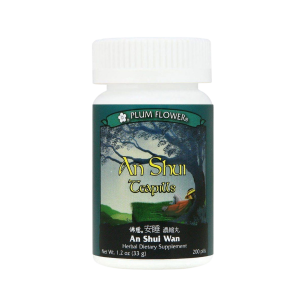 Plum Flower – An Shui Teapills (An Shui Wan)
Plum Flower – An Shui Teapills (An Shui Wan)
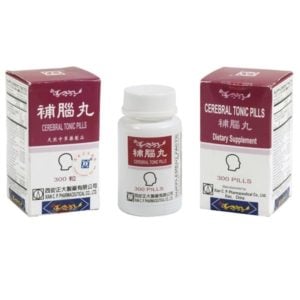 Cerebral Tonic (Bu Nao Wan) for Mental Alertness
Cerebral Tonic (Bu Nao Wan) for Mental Alertness